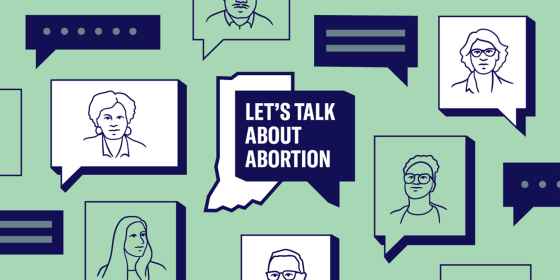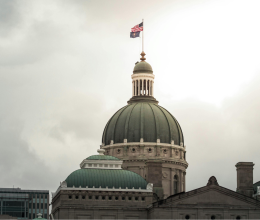Note: This column originally appeared in the Bloomington Herald Times.
Forty-five years ago, the U.S. Supreme Court affirmed a woman’s right to abortion. The landmark ruling in Roe v. Wade recognized that women have a fundamental right to decide when and whether to have a child – without undue political interference.
The unconscionable alternative, memorably portrayed in the novel and television series A Handmaid’s Tale, is allowing the government to force women to give birth against their will.
Today, while seven out of 10 Americans oppose overturning Roe, attacks on women’s reproductive rights have continued unabated, and here in Indiana they’ve intensified. Indiana politicians who pledge to make government smaller and less intrusive on the campaign trail are all too eager once elected to barge right into the exam room and intrude on a woman’s right to make her own medical decisions.
Fortunately women have two potent means of defending their constitutional rights: the courts and the power of collective action – and they’re using both to prevent A Handmaid’s Tale from becoming a reality in the Hoosier State.
In 2016, a federal judge in Indiana blocked one of the most extreme and restrictive anti-abortion laws in the country from taking effect. HEA 1337 would have imposed unprecedented, unconstitutional restrictions on women seeking abortions and their health care providers. Filing two lawsuits on behalf of Planned Parenthood of Indiana and Kentucky (PPINK), the ACLU of Indiana challenged multiple provisions of this unconstitutional law and have so far been successful in protecting women’s access to reproductive health services. On February 15, the U.S. Court of Appeals for the Seventh Circuit will hear oral arguments in the case as we continue to fight to strike down this law for good.
Last year we also succeeded in blocking another unconstitutional abortion law, SEA 404, which imposed draconian requirements on physicians and threatened the health, safety, and privacy of young women seeking abortions.
On the national level, the courts have served as an essential bulwark against the extreme and unconstitutional policies of the Trump-Pence administration. Last year, a federal court in Pennsylvania preliminarily blocked President Trump’s attempt to allow businesses to refuse to cover contraception. And courts in the District of Columbia have twice ordered the Trump administration to stop obstructing access to abortion for teenagers in federal immigration custody.
But the courts aren’t the only weapon we have in the battle for women’s reproductive rights.
Over the past year, women of all ages, races, and backgrounds have stepped up and used the power of collective action to defend reproductive rights in their communities. Recognizing that reproductive rights are essential to the overall wellbeing of women in every other sphere, these freedom fighters are lighting up phone lines, talking to their neighbors, and running for office themselves.
Thousands have signed up to be part of the ACLU’s new grassroots mobilization platform, PeoplePower, which is channeling this groundswell of activism into concrete progress at the local level. Together, they are helping to throw a wrench in the divisive Trump-Pence agenda and protect access to abortion – with women leading the way.
Elected officials and those vying to serve in 2018 should take note.
A half-century after Roe v. Wade, abortion rights are under greater threat than ever before – but women are in a stronger position than ever to defend them.




